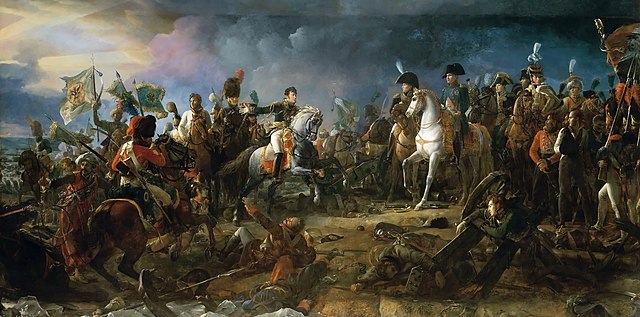The Napoleonic Wars (1803-1815) were a series of conflicts involving Napoleon Bonaparte’s French Empire and a coalition of European powers determined to defeat him and his expansionist ambitions. These wars were a defining period in European history and featured several key battles. Here are some of the most significant battles of the Napoleonic Wars:
Battle of Trafalgar (1805):
A naval engagement fought off the coast of Spain, the Battle of Trafalgar pitted the British Royal Navy, under Admiral Horatio Nelson, against the combined fleets of France and Spain. The British achieved a decisive victory, which not only secured British naval dominance but also prevented Napoleon from launching an invasion of Britain.
Battle of Austerlitz (1805):
Often called the Battle of the Three Emperors, this clash took place near Austerlitz in Moravia (modern-day Czech Republic). Napoleon’s French forces defeated a Russo-Austrian army, leading to the dissolution of the Holy Roman Empire and enhancing Napoleon’s reputation as a military genius.

Battle of Jena-Auerstedt (1806):
This battle occurred during the War of the Fourth Coalition. Napoleon’s forces defeated the Prussian army in two separate engagements, leading to the collapse of Prussia as a major European power.
Battle of Friedland (1807):
Part of the War of the Fourth Coalition, the Battle of Friedland was fought between the French and Russian armies in what is now modern-day Kaliningrad, Russia. Napoleon won a decisive victory, leading to the Treaty of Tilsit, which established a short-lived peace between France and Russia.
Peninsular War (1808-1814):
While not a single battle, the Peninsular War was a prolonged and brutal conflict in the Iberian Peninsula. The British and their Portuguese and Spanish allies fought against French forces. Key battles within this campaign included the Battle of Talavera (1809), the Battle of Salamanca (1812), and the Battle of Vitoria (1813). The Peninsular War severely drained French resources and contributed to Napoleon’s eventual downfall.
Battle of Borodino (1812):
This battle was the largest and bloodiest of the Napoleonic Wars. Fought near Moscow, Russia, it was a pivotal moment in Napoleon’s ill-fated invasion of Russia. The French and Russian armies suffered heavy casualties, but it ultimately led to the French occupation of Moscow, which proved unsustainable.
Battle of Leipzig (1813):
Also known as the Battle of Nations, this massive engagement involved the French army facing a coalition of Russian, Prussian, Austrian, and Swedish forces. It resulted in a decisive defeat for Napoleon and marked a turning point in the Napoleonic Wars.
Battle of Waterloo (1815):
Perhaps the most famous battle of the Napoleonic Wars, the Battle of Waterloo took place in present-day Belgium. Napoleon, recently returned from exile, faced British and Prussian forces led by the Duke of Wellington and Gebhard Leberecht von Blücher. The defeat at Waterloo led to Napoleon’s second abdication and his exile to Saint Helena.
These key battles represent only a portion of the numerous engagements that occurred during the Napoleonic Wars. Ultimately, they played a central role in shaping the course of European history, contributing to the rise and fall of Napoleon Bonaparte and the redrawing of political boundaries on the continent.











